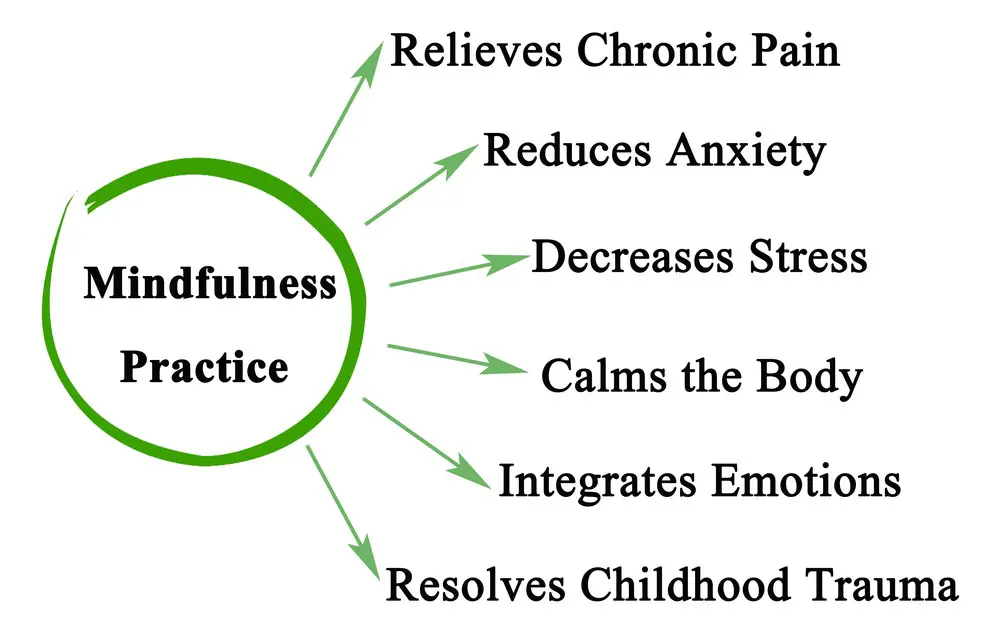As a BetterHelp affiliate, we receive compensation from BetterHelp if you purchase products or services through the links provided
To address single mothers’ everyday stressors and provide effective coping strategies, we’ve gathered five insightful responses from experts, including a psychology expert and a CEO. From embracing mindfulness amidst multiple roles to advocating for flexible work structures, these professionals offer their best advice to help single mothers overcome their unique challenges.
- Embrace Mindfulness Amidst Multiple Roles
- Join Social Media Communities for Support
- Counter Stigma with Self-Affirmation
- Alleviate Financial Stress through Budgeting
- Advocate for Flexible Work Structures
 Embrace Mindfulness Amidst Multiple Roles
Embrace Mindfulness Amidst Multiple Roles
One common cause of stress for single mothers is the overwhelming responsibility of juggling multiple roles—provider, caregiver, and emotional support—often without adequate support. From my experience in life coaching, I’ve seen how this can lead to feelings of isolation and burnout.
To ground yourself, the best way to overcome this is to create a mindfulness routine, just ten minutes daily, either through meditation or deep breathing. This practice brings you back to the present moment, helps declutter the mind, and creates a mental buffer, allowing single mothers to respond to challenges with clarity and calmness.
Over time, this consistent practice can lead to improved emotional regulation, reduced feelings of overwhelm, and a heightened sense of well-being.
Bayu Prihandito, Psychology Expert, Life Coach, Founder, Life Architekture
Join Social Media Communities for Support
For many single moms, a common stressor is that they are sometimes unsure how to handle certain parenting situations. When you don’t have another person to discuss parenting a certain way, it can make a person feel like they don’t know what they are doing. They fear they might make a mistake, and it can cause a lot of anxiety.
Having a support group is a helpful way to mitigate some of these feelings. Social media communities via Facebook and Instagram are great for this, as you can find many other mothers who might be going through similar things. Asking for advice and making these connections can help single moms not feel alone and understand what other single moms are doing regarding their parenting.
Kristie Tse, Founder, Uncover Counseling

Counter Stigma with Self-Affirmation
As a single mother, you must face a lot of societal stigma and judgment. This can cause stress, and handling this situation can be difficult. One way to overcome this situation is to find support from understanding people, reevaluate negative thoughts, and emphasize personal strengths and accomplishments. This approach helps reduce the impact of stigma and boosts self-confidence.
Steven Wright, Co-Founder and Chief Editor Lifestyle to the MAX
Alleviate Financial Stress through Budgeting
Managing finances on a single income is a common stressor for single mothers, but effective strategies exist to alleviate this burden. Creating a well-thought-out budget is a crucial first step, as it helps single mothers track their expenses and allocate funds wisely.
It’s essential to distinguish between needs and wants and prioritize costs like housing, food, and healthcare. Seeking financial assistance, such as government programs or community resources, can provide valuable support when necessary. Exploring options like child support from the other parent can significantly ease the financial strain if applicable.
When appropriate, open and honest communication about financial matters with children can also teach them valuable money management skills and reduce stress. Proactively managing finances through budgeting and accessing available resources is essential for single mothers to achieve financial stability and reduce stress in their daily lives.
Bill Lyons, CEO, Griffin Funding
Advocate for Flexible Work Structures
One common cause of stress for single mothers is the struggle to balance work and family life. A potential solution is advocating for flexible work structures with their employers, such as part-time roles or telecommuting opportunities. Implementing a clear schedule with distinct slots for work, family, and personal time, a method known as time-blocking, can also help alleviate this stress by promoting a more balanced lifestyle.
James McNally, Managing Director, SDVH [Self Drive Vehicle Hire]

Put Expert Tips into Action: Your Stress-Busting Game Plan
Knowing what the experts say is one thing; putting that advice into practice is another ball game altogether. Here’s your step-by-step game plan to help you weave these tips into the fabric of your daily life.
1. Create a Mindfulness Morning Routine
- How to Start: Carve out just ten minutes each morning before the kids wake up or after they’re settled with breakfast.
- Pro Tip: Use a free mindfulness app to guide your sessions initially.
2. Join a Single Moms’ Community Online
- Where to Look: Search Facebook for “Single Moms Support Groups” or browse Instagram hashtags like #SingleMomLife.
- Why It’s Helpful: These platforms offer a sense of camaraderie so you don’t feel alone in your journey.
3. Daily Self-Affirmations
- Easy Start: Write three positive affirmations about yourself on sticky notes and place them on your bathroom mirror.
- Remember: You’re countering societal stigma, one affirmation at a time!
4. Start a Budget Journal
- Getting Started: Pick up a simple journal or use a budgeting app to keep track of income, bills, and expenses.
- Bonus: Include your kids in the budget conversation, turning it into an educational moment.
5. Advocate for Work Flexibility
- How to Approach: Draft an email or request a meeting with your HR department to discuss available options.
- Key Point: Be prepared with reasons for how this will benefit you and improve your work performance.
Implementing these changes won’t happen overnight, but taking small steps daily brings you closer to a stress-free life. Keep in mind that self-improvement is a journey, not a sprint.

Red Flags: How to Recognize When It’s Time for Therapy
If you’re spinning multiple plates in the air as a single mom and find it increasingly difficult to cope, it may be time to consider professional help. Here’s how you can recognize the signs that therapy might be the right next step for you:
1. Overwhelming Emotional Outbursts
- What to Look For: Quick to anger, uncontrollable crying, or extreme reactions to minor inconveniences.
- Why It’s a Sign: These can indicate deeper emotional or mental health issues that need addressing.
2. Consistent Lack of Energy
- Symptoms: Feeling tired despite adequate sleep or struggling to get out of bed day after day.
- Why It’s a Concern: Chronic fatigue could signify depression or other emotional burdens.
3. Social Withdrawal
- What to Note: Skipping social events, ignoring calls, or avoiding friends and family.
- The Underlying Issue: Social isolation can exacerbate stress and mental health conditions.
4. Changes in Eating or Sleeping Habits
- Signs: Drastic weight gain or loss, insomnia, or oversleeping.
- What It Could Mean: These could be physical manifestations of psychological stress or anxiety.
5. Escaping Through Unhealthy Coping Mechanisms
- Red Flags: Overuse of alcohol, comfort-eating, or even excessive shopping.
- The Problem: These are temporary fixes to deeper issues, acting as Band-Aids, but not cures.
6. Decreased Work or School Performance
- What to Look For: Missed deadlines, lack of concentration, or declining grades for your kids might reflect your stress.
- Deeper Issue: Your mental well-being directly impacts your functionality.
7. Loss of Joy in Things You Loved
- Symptoms: No longer enjoying your favorite activities or avoiding hobbies you once cherished.
- Cause for Concern: This detachment might indicate a deeper emotional or mental health problem.
Remember, acknowledging the need for help isn’t a sign of weakness but a step toward self-improvement. Therapy can offer coping strategies, actionable advice, and emotional relief. Most importantly, it’s about prioritizing your mental health so you can be the best mom you can be.
Mapping Your Road to Wellness: Setting Goals and Tracking Progress in Therapy
Once you’ve made the brave choice to begin therapy, setting meaningful goals and tracking your progress is essential. Here’s a guide to get you started:
1. Identify Your Needs
- Why It’s Important: You’re the expert on your life. Setting specific and personalized goals helps your therapist understand your unique needs.
- Tips: List concerns you’d like to tackle—from improving your coping mechanisms to finding healthier ways to communicate with your kids.
 2. SMART Goals
2. SMART Goals
- The Acronym: SMART stands for Specific, Measurable, Achievable, Relevant, and Time-bound.
- How to Use It: Instead of a vague goal like “I want to be happier,” aim for something more specific, like “I want to reduce my anxiety attacks to once a month or less in the next six months.”
3. The Importance of Mini Goals
- What They Are: These are smaller, achievable milestones that pave the way for your major goals.
- Why They Help: Achieving mini goals can boost your confidence and offer a sense of accomplishment, making the bigger objectives seem more attainable.
4. Embrace Flexibility
- What It Means: It’s okay if your goals evolve. Life changes, and your therapy goals can, too.
- Advice: Keep an open line of communication with your therapist, and don’t be afraid to adjust your goals as needed.
5. Track Your Progress
- Tools to Use: Utilize journals, mobile apps, or even simple Post-It notes to jot down your thoughts, feelings, and any small victories.
- The Benefit: Tracking helps you and your therapist recognize patterns, celebrate wins, and identify areas that need more focus.
6. Involve Your Support System
- Why It’s Helpful: Progress doesn’t happen in a vacuum. Sharing your goals and achievements with trusted family or friends can offer additional accountability and encouragement.
- Caution: Choose this circle wisely; the last thing you want is negative energy hindering your progress.
 7. Regular Check-ins with Your Therapist
7. Regular Check-ins with Your Therapist
- How Often: Ideally, every 4-6 sessions, revisit your goals with your therapist.
- What It Accomplishes: This ensures that you’re on the right path and allows you to make necessary adjustments to your strategies or goals.
Embarking on a therapeutic journey is an act of self-love. Knowing what you aim to achieve and how to measure your progress can make the ride smoother and more rewarding. Remember, therapy is a two-way street; you get out what you put in. Happy healing!
About Jacob Maslow
After surviving the traumatizing events of 9/11, I took it upon myself to heal through helping others. I’m the primary caregiver of my children and understand from first-hand experience the lonely paths you have to walk as a partner and parent when leaving an unhealthy relationship.
We’re all echoing in a dark space that doesn’t have to be this empty, and that’s been my mission since finding solace and recovery in therapy: To help comfort others who are still in shock and at the prime of their struggle.
I came across BetterHelp after searching for this type of community. I wanted to belong to a body of proactive therapists and supportive therapy veterans that allowed me to see other sides of the story.
It was unconventional, and that’s what attracted me most. During my most challenging times, when my ex-wife completely cut me off from my children, I found comfort and clarity through BetterHelp.
Instead of being chained to a strict therapist recommendation, I was in charge of who I felt understood my struggle most. That’s what allowed me to find my true peace, as I was reunited with those who read behind my words and had first-hand experience with my trauma.
Recovery is a choice; with BetterHelp, that choice will be a few clicks away.
- 7 Ideas to Help You Relax and Unwind on a Family Vacation - April 27, 2025
- How Having Cybersecurity Protection Helps You Relax - April 25, 2025
- 8 Reasons Why Spending Time Outside Calms You Down - April 25, 2025
This site contains affiliate links to products. We will receive a commission for purchases made through these links.


 Embrace Mindfulness Amidst Multiple Roles
Embrace Mindfulness Amidst Multiple Roles 2. SMART Goals
2. SMART Goals 7. Regular Check-ins with Your Therapist
7. Regular Check-ins with Your Therapist
